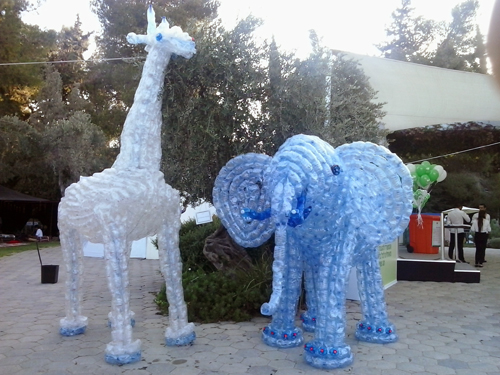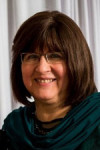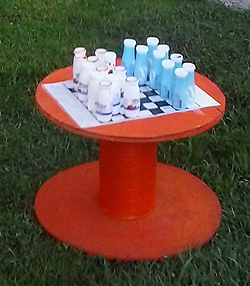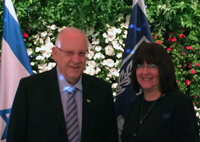
By Toby Klein Greenwald

 JERUSALEM–President Reuven “Ruby” Rivlin has broken many molds already since taking office. He may be the most citizen-friendly president ever to sit in that hallowed position, is truly dedicated to bridging the gaps in Israeli society and is a born and bred Jerusalemite, of the Rivlin family, descendants of the Vilna Gaon, who have lived in Jerusalem for more than two hundred years.
JERUSALEM–President Reuven “Ruby” Rivlin has broken many molds already since taking office. He may be the most citizen-friendly president ever to sit in that hallowed position, is truly dedicated to bridging the gaps in Israeli society and is a born and bred Jerusalemite, of the Rivlin family, descendants of the Vilna Gaon, who have lived in Jerusalem for more than two hundred years.
He is also a president who has raised the environmental issue to a place of serious stature. Though, in his speech from the podium, at a Succot event, President Ruby Rivlin said, humbly, that his wife, Nechama, was his inspiration.
Nechama, he said, was the spirit behind the creative and colorful exhibition on the environment and agriculture held on their spacious lawn, in the lobby and in the succaH of the President’s residence on October 13, during chol hamoed (the intermediary days of) Succot. It was created in partnership with the Ministry of Environmental Protection together with the Ministry of Agriculture, with the theme of “Sukkot in the Environment.”
“There are already, at the President’s Residence, a community garden, a compost and recycling area, and as I know Nechama, this is just the beginning,” he said.
The extent to which organizations and companies in Israel are working on recycling, on conservation and on planning magnificent public green spaces and on creating affordable energy is inspiring and echoes of these goals are apparent around the country. Here were a few examples we could see that day:
Biogas system for the family and farm: This large piece of equipment, invented by the Tevagas company (www.homebiogas.com), treats both kitchen waste and animal manure, producing clean cooking gas and clean organic liquid fertilizer. Right now, the inventors told me, it is being used mostly by the Bedouin in the Negev, but they hope that it will soon enter the general Israeli market, Africa and beyond. Yair Teller is the young visionary who is the “passion” behind the product. He’s been working on it for eight years. Their website explains that it is not only economical, but also healthy.
Plastic recycling: There were a number of exhibits on this topic. An exhibitor explained that the plastic water bottles are made into various plastic objects and even used in the production of fleece jackets. One exhibit, that was visited by scores of children, displayed how tiny yogurt cups could be transformed into chess or checker pieces on large chess boards.
One of the favorite exhibits was a giant giraffe and elephant made from plastic water bottles — with bottle caps as toenails! Many of these ideas are beginning to stretch the imaginations of ordinary Israelis, as well. I shared with the exhibitors a photo of a succah wall created from plastic water bottles by my friend, Shifra Penkower, on the porch of her Efrat home; she even recycled the labels into paper chains.
Musical instruments for playgrounds recycled from junk: The brains behind this project, EcoMusic (www.eco-music.org) is Gil Bohadana. At the president’s exhibit Bohadana displayed drums, a standing windpipe instrument and others with which he and his colleagues regaled the crowds in the course of the day, with a performance they call “Music from the Junkyard.” They also run workshops for communities, schools and children to help others learn how to achieve the same results.
Another of President Rivlin’s recent projects can be seen in the community of Alon Shvut, in Gush Etzion. When an old playground was upgraded, a small musical area that will be called “Manginat Daniel” (“Daniel’s Melody”) was created, with instruments from recycled objects, by Bohadana, who also gave a concert there on the Friday of Succot. The musical area is in memory of Lieutenant Daniel Mandel, who was killed in battle in Shchem (Nablus), in 2003, while leading his soldiers in an operation to capture three wanted terrorists responsible for the deaths of at least thirty people.
Large green spaces: Three large new parks, being developed in Israel were on display, one of them the magnificent Beersheva River Park, called “a transformative park in Southern Israel, the ecological park of the Negev’s capitial.” A former garbage dump, it has been transformed into a green park with flowers and recreational activities and will include a Pipe bridge, lake and archeological areas.
Even sun hats: One winsome stand had a group of young women showing children and others how to turn newspapers and other materials into durable sun hats, a welcome addition to the hot day.

A Succah filled with fruit and light: The president’s succah was the location chosen to exhibit some of the remarkable agricultural progress in Israel; there were baskets and stands filled with richly colored vegetables and fruits, including etrogim of exotic sizes and shapes. There was a “Wall of Nature” decorated with a wide array of produce and luscious flowers. It was in this fragrant area that, true to form, the citizen-friendly president patiently allowed visitors to have souvenir photos taken with him (including this usually camera-shy reporter).
Coming together as a people: The artistic performances of the day were short and sweet – and were repeated twice more in the course of the day, for the pleasure of a maximum amount of visitors. There were glorious Israeli dancers, singers, acrobats, the police band and a breath-taking gymnastic presentation.
But most moving of all was the speech of the President himself. A few excerpts, that highlight his desire to bring the Israeli people together: “A Sukkah is open to anyone, without barriers…The sukkah takes us out of our personal comfort zone, and invites us to see who and what is around us…Mankind does not live along. Our actions have a decisive influence on the whole environment…From my wife, Nechama…I learned to be sensitive…toward all that makes up our environment: People, animals, plants and flowers.
“From Nechama I learned the importance of our personal commitment…of maintaining the place where we live, in which our children and grandchildren will live also.” He asked the crowd to each take upon themselves something for the good of the environment.
“In Jewish tradition, this year marks the shmitta year, when we allow the earth to be fallow, an environmental sabbatical, for the economy and for the individual. Respite for the land and the economy fits together with a common principle of social and environmental responsibility…
“Dear guests, as you enter our sukkah, Nechama and I would like to congratulate all of us, that we are able to sit together ‘in one sukkah’ and remove the barriers between us, and find that which we have in common…May I extend my warmed congratulations to all the pilgrims to Jerusalem…and may we have a year of health and peace, in which we care for each other and feel friendship for each other.”
Minister of the Environment Amir Peretz, who had the foresight to confront skeptics and push for the development of the Iron Dome, when he was Minister of Defense in 2006-7, touched a chord in everyone when he referred to Operation Protective Edge, and how people were relieved when newscasters said that rockets had fallen “in open (unpopulated) spaces.” He said, “As minister of Defense I had to worry about populated areas. Now [as minister of the environment] it’s my job to worry about the open spaces.”
As I left the spacious grounds, I saw President Ruby Rivlin outside on a high stand, addressing the myriads who were too numerous to take individual photos with him. “Take selfies with your children [on the background of my speech],” he said, and shared with the crowd that later that day he would be meeting with Ban Ki-moon, secretary general of the UN. “I will tell him that we commemorate Succot because we lived in succot when we wandered in the desert,” he said, “and now we are home.”
*
Greenwald is a freelance writer based in Jerusalem.
Hello. Could someone put me into contact with the artist who made these sculptures? Thank you!